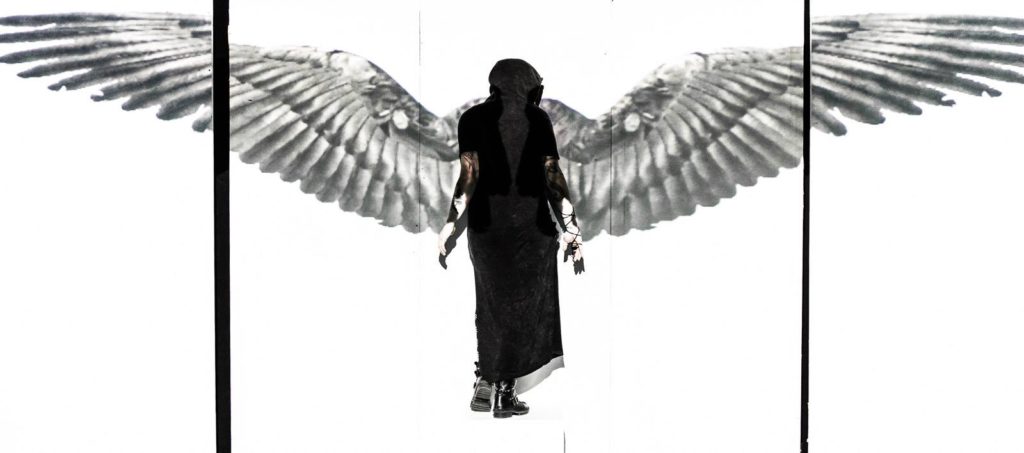Dr Faustus meets cyberspace: the past and the future collide in perfect harmony!!

In a small empty space illuminated by several enlarged computer screens, a shadowy figure sits contemplating the lists of glowing symbols, mathematical signs, and strange calculations whizzing along in front of us. This is the current knowledge of the world enticing the ambitious Faustus who wants to meet Mephistopheles as he vows to give his soul to the devil.
William Beddoe’s Ottawa Fringe performance transforms Faust into a magnificently larger than life new –age human being thrown into dialogue with the beautifully sinister and highly seductive Mephistopheles (Steph Goodwin) who toys with Faust and delights in torturing him as she (here she has flaming red hair) attaches herself to his soul and makes us realize that a superior actor should be one who can whisper and still be heard throughout the whole theatre!
Christopher Marlowe’s text dates from the 1 6th century and Andrew Alexander’s adaptation which retains the original language: “O, might I see hell, and return again safe, How happy were I then!” while eliminating most of the characters and reducing greatly the length of the script to produce a less than 60 minute show, creates a surprisingly coherent work on the stage. Strong video and lighting design (Graham Price and Andrew Alexander) give new life to the text without undue exaggeration of visual effects but rather a perfect selection of photo journalistic clips, images from TV adds, and other visual bits that send us up and away as Faust travels the world through Marlowe’s baroque images, discovering that which he has never seen. In fact, the text lends itself to this visual and textual collaboration which one could never have expected.
The most striking moments showed the fusion of cyber world and theatre when Beddoes/Faust, shown standing in front of all those screens exposes his total power over the universe by orchestrating disaster and horrific destruction that file before us as real TV images of human tragedy caught by the TV cameras. Another excellent moment of staging was the appearance of Helen, a perfectly delicate mask, the face that launched 1000 ships, as Faustus declares his love and becomes her ultimate lover Paris. The discussion with the good angel and the evil angel that reveal his terror before hell, his call to God to redeem him, is all carried out with faces that appear on the screen in their own space in some faraway place. A visual dissection of Faustus’ brain as he is suddenly shifted off to hell shows more excellent use of this visual technology that translates to the stage man’s links with the metaphysical world, something that the materialism of the acting space would never be able to capture as the 19th century symbolist movement had already predicted.
A fascinating moment of Fringe theatre in the Arts Court Theatre. # Faustus is a must see.
Plays in Arts Court Theatre
Saturday 16 at 6pm
Sunday 17 at 3h30 pm
Tuesday 19 at 9h30 pm
Friday 22 at 7h30 pm
Sunday 24 at 1hoo pm